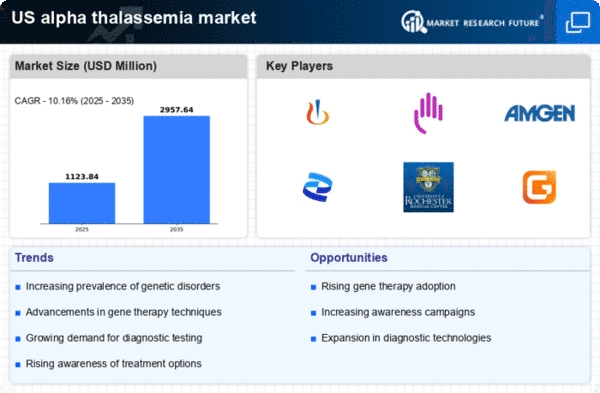Government Initiatives and Funding
Government initiatives aimed at improving healthcare access and funding for genetic disorders are pivotal for the alpha thalassemia market. In the US, various federal and state programs are being implemented to enhance awareness, screening, and treatment of genetic conditions, including alpha thalassemia. Increased funding for research and development in this area is likely to lead to breakthroughs in treatment options. Additionally, public health campaigns aimed at educating the population about genetic disorders may result in earlier diagnosis and intervention, which could positively impact the market. The alpha thalassemia market stands to gain from these supportive government actions, which are designed to improve health outcomes for affected individuals.
Growing Demand for Genetic Testing
The rising demand for genetic testing is a significant driver for the alpha thalassemia market. As awareness of genetic disorders increases, more individuals are seeking testing to understand their risk of inheriting or passing on alpha thalassemia. This trend is particularly evident among populations with a higher prevalence of the disorder, such as those of Mediterranean, African, and Southeast Asian descent. The market for genetic testing services is expanding, with advancements in technology making testing more accessible and affordable. This increased demand for testing is likely to lead to a greater need for counseling and follow-up care, further stimulating growth in the alpha thalassemia market. The integration of genetic testing into routine healthcare practices may also enhance early detection and management of the disorder.
Advancements in Treatment Modalities
Innovations in treatment modalities for alpha thalassemia are significantly influencing the alpha thalassemia market. Recent advancements in gene therapy and novel pharmacological agents have shown promise in managing the disorder more effectively. For instance, therapies that target the underlying genetic causes of alpha thalassemia are emerging, potentially transforming patient outcomes. The market is witnessing a shift towards personalized medicine, where treatments are tailored to individual genetic profiles. This evolution in treatment options is likely to attract investment and research funding, further propelling market growth. As new therapies gain regulatory approval, the alpha thalassemia market could experience a surge in demand, reflecting the need for innovative solutions to address this complex condition.
Rising Prevalence of Alpha Thalassemia
The increasing prevalence of alpha thalassemia in the US is a critical driver for the alpha thalassemia market. Recent estimates suggest that approximately 1 in 4,000 individuals in the US are affected by this genetic disorder. This rising incidence necessitates enhanced healthcare services and treatment options, thereby expanding the market. The growing number of diagnosed cases is likely to lead to increased demand for diagnostic tools and therapeutic interventions. Furthermore, as awareness of genetic disorders increases, more individuals are likely to seek genetic testing, which could further contribute to market growth. The alpha thalassemia market is thus positioned to benefit from this upward trend in prevalence, as healthcare providers and pharmaceutical companies respond to the needs of affected populations.
Increased Collaboration Among Stakeholders
The alpha thalassemia market is experiencing increased collaboration among various stakeholders, including healthcare providers, researchers, and pharmaceutical companies. This collaborative approach is fostering innovation and accelerating the development of new therapies and diagnostic tools. Partnerships between academic institutions and industry players are becoming more common, leading to shared resources and expertise in addressing alpha thalassemia. Additionally, patient advocacy groups are playing a crucial role in raising awareness and promoting research initiatives. This synergy among stakeholders is likely to enhance the overall landscape of the alpha thalassemia market, as collective efforts aim to improve patient outcomes and drive advancements in treatment options.
















